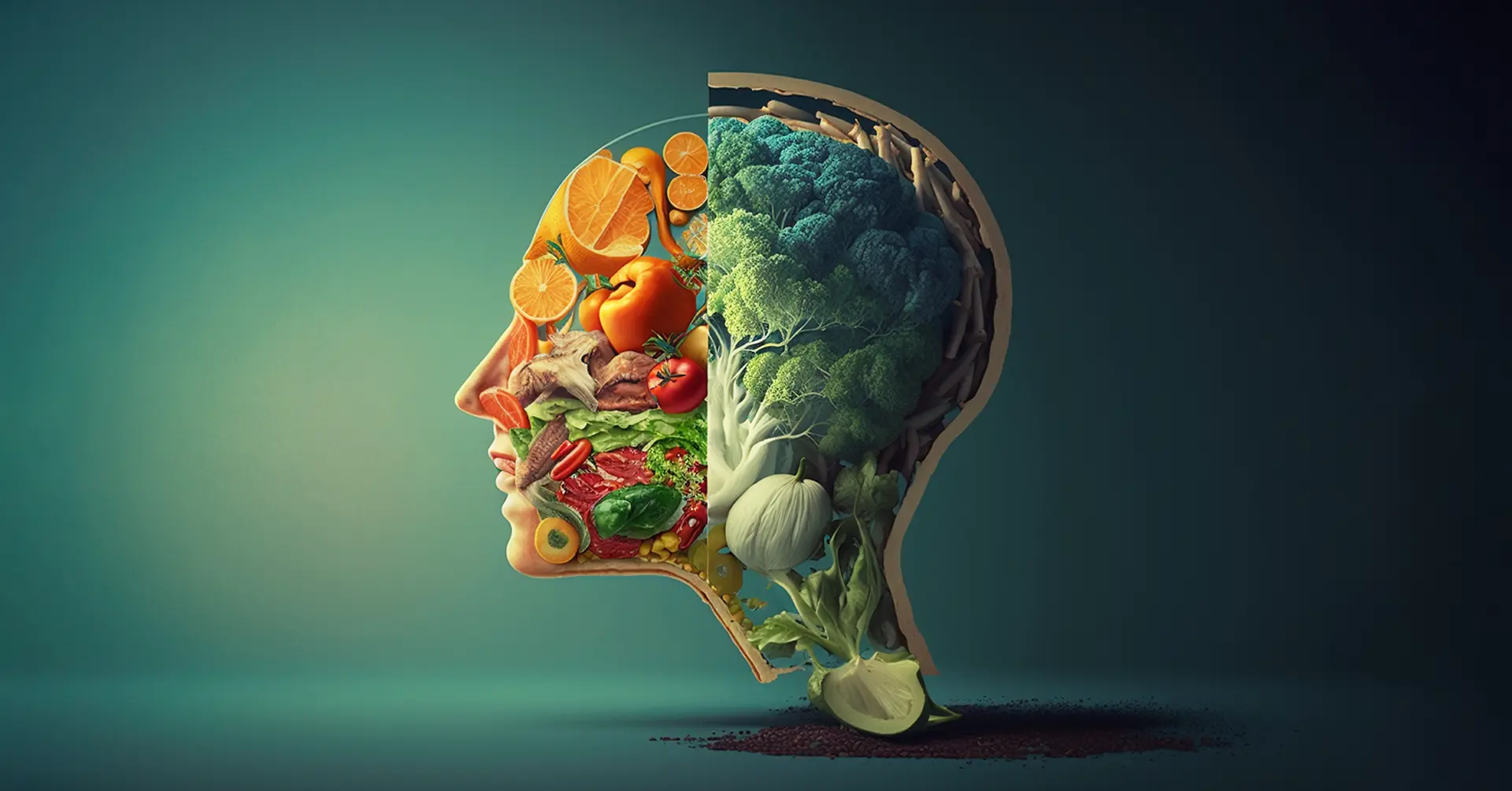Our increasingly hectic lifestyles often overlook the link between mood+nutrition tips for mental health. Consider the relevance of this link. All of us must acknowledge the link between what we eat and how we feel since it affects our mental health.
This detailed blog article will examine the fascinating relationship between food and mood and provide dietary suggestions for mental wellness. We’ll also examine how your plate influences your mood in several ways.
1. Understanding the Relationship Between Food and Nutrition
The Mood and Nutrition Connection is more than a catchphrase—it’s founded on science and highlights how eating choices affect our moods. Beyond a slogan, “The Mood and Nutrition Connection” makes sense.
Neurotransmitters and hormones are synthesized and disseminated throughout the brain’s various neural circuits, regulating our emotions.
Chemical messengers mediate emotional information processing. We must understand this link since diet is so important to this equilibrium.
2. The Crucial Role of Macronutrients
The following macronutrients should mood + nutrition Tips for Mental Health:
Proteins contain
These complex molecules are found in all living organisms and are needed to synthesize neurotransmitters like serotonin and dopamine. To sustain mood chemistry, consume lean meats, fish, eggs, and other animal and plant-based protein sources.
Carbohydrates
Carbohydrates, the brain’s main fuel, affect mood and cognition. Select complex carbs from whole grains, fruits, and vegetables to sustain energy and maybe calmness. Complex carbohydrates are in muesli, fruits, and veggies.
Fats
Because they reduce brain inflammation, omega-3 fatty acids are particularly effective for enhancing mental health. Omega-3s are unique among fats. These fatty acids are abundant in walnuts, flaxseeds, and fatty fish, making them good foods.
3. Key Micronutrients for Mood Enhancement
Vitamins and minerals are important while discussing Mood + Nutrition Tips for Mental Health:
Vitamin D
Since vitamin D, the sunshine vitamin, is widely believed to boost mood, it is often utilized in this context. Maintaining mental health requires enough vitamin D consumption. Getting enough light or eating vitamin D- and omega-3-rich foods like fatty fish and fortified meals will help. It’s crucial either way.
Vitamin B Complex
Neurotransmitters need plenty of B vitamins, notably B6, B9 (folate), and B12. Legumes, greens, lean meats, and cereals are supplemented with these vitamins, making it easier to get enough.
Minerals
Minerals like magnesium and zinc help keep a happy outlook. Nuts, seeds, lean meats, and entire grains should be in your diet. Doing so ensures you get enough micronutrients to be mentally healthy.
4. The Intriguing Gut-Brain Connection
Mood + Nutrition Tips for Mental Health is increasingly focusing on the digestive system and mind. Recent research has demonstrated that gut flora strongly impacts mental well-being. Microbiota cause emotions, as demonstrated.
For a healthy gut and a more stable mind, eat high-fiber vegetables and legumes and probiotic-rich yogurt and kefir. Yogurt, kefir, and others are probiotic-rich. Consuming more foods from these categories may provide the advantages listed.
5. Foods That Instantly Boost Your Mood
The following meals have been shown to affect mood:
- Dark chocolate is tasty and contains antioxidants that may boost endorphin production.
- Berry antioxidants and vitamin C decrease stress and inflammation, improving mood and outlook. Berries are antioxidant-rich. Berries are rich in antioxidants.
- Green tea, rich in L-theanine and relaxing, is popular globally. L-theanine may quiet the brain due to its soothing effects.
6. Implementing Mood + Nutrition Tips for Mental Health in Your Daily Life
The following strategies are essential for lifelong mental health:
- A balanced diet ensures you obtain adequate vitamins and minerals. That’s why every meal should include a variety of fruits, vegetables, and macronutrients.
- Drink enough water throughout the day to avoid mood and thinking issues caused by dehydration. If not, your mental health and mood may suffer.
- Reduce sugar and processed meals since they may cause your blood sugar to fluctuate, affecting your mood and energy. Diets heavy in sugar and processed foods may cause larger swings.
- Overeating may cause discomfort and tiredness, so it’s vital to watch how much you consume.
- Mindful eating may help you build a healthy relationship with food by focusing on the meal, appreciating each mouthful, and reducing distractions.
7. Seeking Professional Guidance
If you have mood problems or other mental health difficulties, get professional treatment. Consult a doctor or nutritionist for personalized Mood+Nutrition Tips for Mental Health.
8. Meal Planning for Optimal Mental Health
Meal planning is advised to maximize the benefits of Mood+Nutrition Tips for Mental Health. This prophylactic strategy ensures that your diet always includes mood-regulating elements. Start by making a week’s meal plan with several nutrient-dense items.
Include them in your everyday diet. Finding what you need will be simpler, and you’ll be less tempted to purchase junk food when you’re hungry and short on time.
9. The Significance of Timing
Mealtime is one of the most important in mood+Nutrition Tips for Mental Health, but many people don’t pay enough attention to it. Due to more constant blood sugar levels, eating at regular intervals reduces energy dips and mood swings.
This is because insulin affects blood sugar. Three balanced meals and as many healthy snacks as needed should make up your daily diet. This diet may help you maintain energy and mood.
10. Food Journaling
Keeping a food diary might help you link your diet to your mood and energy. Keeping a food and mood diary may help you understand how your diet affects your mood. Include everything you consume, including between-meal snacks. Experience will help you see patterns and make smart mental health changes.
11. Cooking for Mental Wellness
Making your food may be soothing and educational. Cooking your food lets you control what goes in it, making it easier to include Mood+Nutrition Tips for Mental Health into your everyday routine.
Try new things, learn about various cuisines, and have fun in the kitchen to maximize cooking’s creativity. This might make your dinner more enjoyable.
12. Social Eating for Emotional Nourishment
Individual dietary requirements are crucial, but social elements of eating should be considered. Family dinners and group eating have been shown to improve mental health, reduce stress, and boost connectedness. Good company and a fascinating dinner conversation may change your evening.
13. Tailoring Nutrition to Your Unique Needs
Mood+Nutrition Tips for Mental Health may not work for everyone. Age, gender, physical activity, and prior medical conditions may greatly impact nutritional needs. Thus, a licensed dietitian or professional nutritionist may provide customized guidance.
14. The Long-Term Commitment to Mental Wellness
Knowing the relationship between Nutrition and mood is a long-term mental health investment. Finally, examine this. Even if dietary changes improve your mental health immediately, you must maintain a nutrient-rich diet over time to see improvements. Sticking with it is the key to success, and even little adjustments may improve your happiness and well-being.
15. Sustainable Eating Practices for Mental Health
Sustainable practices include both environmental and dietary decisions. When considering Mood+Nutrition Tips for Mental Health, consider how our diets will affect us individually and internationally.
This is because food may profoundly impact our emotions and relationships. Organic, locally grown, and sustainably produced foods reduce your environmental impact and enhance your consumption of unprocessed, nutrient-dense, mental-health-boosting meals. This is because these foods were less likely to be produced using harmful industrial technologies.
16. Mindful Grocery Shopping
If you want to improve your mental health via food changes, start in the store. Prepare for your shopping excursion by compiling a list of everything you need. Start your shopping excursion with pre-made meals and fresh veggies, and avoid the snack area. Food shopping with the Mood+Nutrition Tips for Mental Health in mind may help implement these ideas.
17. Superfoods for Mood Enhancement
Superfoods may boost Mood+Nutrition Tips for Mental Health:
- Turmeric: Turmeric may lower anxiety and depression, according to research. Turmeric’s anti-inflammatory qualities are well-known.
- Avocados: High in monounsaturated fats and vitamin E, avocados support brain function and may soothe emotions. This is because avocados are abundant in these nutrients.
- Walnuts: Neuroprotective antioxidants and omega-3 fatty acids are abundant in walnuts. Adding walnuts to your diet is beneficial.
- Spinach: Spinach contains folate, which is needed for neurotransmitter production and emotional equilibrium. Spinach and other dark greens contain folate.
18. Seasonal Eating for Mental Harmony
In addition to helping you maintain a varied diet, eating seasonally brings you closer to nature’s cycles. Supplementing mental health diets with seasonal fruits and vegetables, which are at their nutritional peak and may include vitamins and minerals, may help mood. Take advantage of seasonal foods to eat healthier.
19. Herbal Teas
Mood + Nutrition may benefit from soothing drinks like herbal teas. Chamomile, lavender, and valerian root teas may help ease stress and promote deep sleep, which is beneficial for mental health. If you drink herbal teas every day, you may enjoy greater peace.
20. Cultivating a Positive Relationship with Food
In addition to physiological Nutrition, a good relationship with food is essential. Eating-related shame and concern may harm mental health. Treat yourself with compassion and respect, and periodically reward yourself for making it through the day. Remembering that food feeds your body and mind may help you eat with thankfulness. This will optimize your event pleasure.
Conclusion
Practicing all the Mood+Nutrition Tips for Mental Health every day is an investment in mental health. Understanding the complicated link between food and mood is fascinating and important because it allows you to regulate your mental health.
Understanding macro- and micronutrients, acknowledging the gut-brain link, and practicing mindful eating may help you become happier and healthier. Following these actions may lead to a happier, healthier life.
By combining meal planning, professional aid, and social eating, you may set the stage for a lifetime of mental health supported by your kitchen and dining choices. This is especially true when considering guests when cooking and eating.
Also Read:
East Asia Cultural Traditions, Foods, and Etiquette
Dominate the Music Industry with Effective Marketing Strategies






